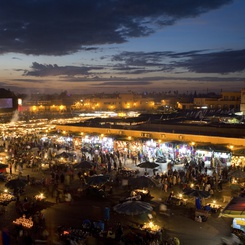Prior to this week’s Global Entrepreneurship Summit in Marrakech, a happy combination of circumstances allowed me to attend last month’s Collective of Associations for Education and Entrepreneurship (CAPEE) in Casablanca. Remarks by panelists and their interactions with the audience helped me identify three encouraging findings, and three points of concern in the Moroccan entrepreneurial ecosystem.
First, the good surprises. The first is the creation of CAPEE which brings together 12 associations, NGOs, and foundations dedicated to improving the quality of education and the promotion of entrepreneurship in Morocco. I can’t list them all here, but rather invite readers to discover the members of CAPEE on their website: http://capeemaroc.org/
If I underline the creation of CAPEE, it’s because this type of initiative is not natural and cannot be taken for granted. The natural tendency of actors in Morocco, and elsewhere, is to simply ignore what others are doing. Worse, they tend see them as competitors who could overshadow them. Hopefully CAPEE and its members will foster cooperation and, over time, will develop complementary roles to serve the entrepreneurial agenda in Morocco.
I was also encouraged by the composition of the panel and the audience. I saw and heard Moroccan entrepreneurs, experts, and activists talking about entrepreneurship in Morocco with other Moroccans. I concluded that the Moroccan entrepreneurial ecosystem is rich in talent and local resources. To grasp the importance of this finding, remember that in some other countries, the entrepreneurship conversation and the entrepreneurial scene are confined mainly to NGOs and international organizations. It has also not escaped me that the international organizations active in Morocco are there through Moroccan representatives and teams.
The tone of the exchanges was the third positive surprise for me. The speakers and the audience interacted with a level of candor that contrasted with the self-congratulatory speech and self-censorship that characterized the public meetings in the Morocco of my youth. While celebrating many commendable initiatives, those present unanimously agreed that there is a huge gap in entrepreneurship in the country and identified some of the structural hurdles. Change for the better won’t be possible unless we nail down the problems, therefore, debate and criticism of the status quo are good news.
The above paragraph gives me a natural transition to the first point of concern. Even if the political will is strong, that talented actors are mobilized and that money is not lacking in the domestic financial system, the rate of entrepreneurial activity is struggling to take off. A member of the roundtable highlighted the weakness of new ventures, and jobs, creation and another lamented the lack of entrepreneurs. The Moroccan public and private associations must make a priority of setting up a system to foster the gestation and delivery of companies. I hope that the awareness of the need for a new stage in the development of the Moroccan entrepreneurial ecosystem will result in the establishment of a “maternal” network (incubators, accelerators and other nurseries) led by real 'midwives' that will inoculate the entrepreneurial virus to large numbers of youth and support the birthing of new companies by those where the virus causes a pregnancy.
In expressing my second point of concern, I would like to warn against the risk of generating artificial entrepreneurs who could do more harm than good. Let me explain: the urgency and magnitude of the employment issue play a key role in mobilizing public, private and associative actors. We should avoid lulling young entrepreneurs into a feeling of false security, or encourage them to think entrepreneurship is a cakewalk by making funds too readily available or providing them with ready-made customers. It would be a shame if the demands of young graduates to have a right to public sector jobs was reinterpreted as a right to start their own business. An entrepreneur who participated in the roundtable stressed that the life of an entrepreneur is made of trials and hardships. Successful entrepreneurs, over time, learn how to bounce back from adversity. Helping young entrepreneurs is important, but we shouldn’t put them in artificial bubbles, either. The Chinese proverb that says it is better to teach people to fish instead of giving them fish is so true for entrepreneurship.
My third and final point of concern focuses on the risk that institutions that promote entrepreneurship become their own end. Cornelius Castoriadis highlighted, long ago, a process by which an organization created to solve a problem, tends to want to perpetuate that problem in order to ensure its own survival. To illustrate this point, an institution for the resolution of the unemployment problem manufactures 'unemployed', just as psychiatric institutions create 'mad' people. Since the Moroccan entrepreneurial ecosystem is still young, the players should be able to prevent this phenomenon. Public, private and associative actors acting in favor of entrepreneurship in Morocco must say they have done their job when their role becomes superfluous. That day, entrepreneurship becomes a normal product of the social system. This should be, in my opinion, the collective ambition of Moroccan actors in the entrepreneurial ecosystem.









